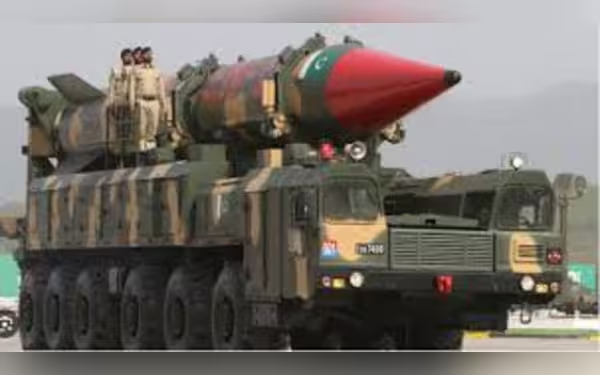Saturday, November 16, 2024 05:56 PM
Nuclear Deterrence Central to Global Power Dynamics
- Nuclear weapons remain vital to military strategies worldwide.
- Russia's nuclear threats escalate tensions in Ukraine conflict.
- Iran's nuclear ambitions raise concerns in the Middle East.
 Image Credits: thefrontierpost
Image Credits: thefrontierpostExperts emphasize the enduring role of nuclear deterrence in global military strategies amid rising tensions.
Nuclear weapons have long been a cornerstone of military strategy for many nations around the globe. Despite the devastating consequences of their use, countries that possess these weapons have shown no intention of relinquishing them. This sentiment was echoed recently when the Nobel Peace Prize committee highlighted the importance of maintaining the nuclear "taboo"—a term that refers to the strong global aversion to using nuclear weapons since their deployment in World War II.
The committee awarded this year’s peace prize to Nihon Hidankyo, a grassroots organization of survivors from the atomic bombings of Hiroshima and Nagasaki. They advocate for a complete ban on nuclear weapons, emphasizing the need to uphold the moral and ethical standards that discourage their use. The committee's statement pointed out that while no nuclear-armed nation has used these weapons in conflict since 1945, the threat of their use remains a significant part of military strategy.
Experts have noted that the ongoing conflict in Ukraine has intensified discussions around nuclear deterrence. Russia, for instance, has frequently invoked the possibility of nuclear action to deter Western support for Ukraine. Alexander Gabuev, a prominent political analyst, remarked that Russian President Vladimir Putin's nuclear threats are strategically timed, particularly around critical discussions involving U.S. and Ukrainian leadership.
Bruno Tertrais, a political scientist, emphasized that Russia has normalized discussions about nuclear weapons since its invasion of Ukraine, which raises concerns about the potential for escalation. Meanwhile, North Korea's leader, Kim Jong Un, has made alarming statements about using nuclear weapons if his country is attacked, further complicating the global security landscape.
In the Middle East, Israel, the only nuclear-armed state in the region, has promised a strong response to any threats, particularly from Iran, which has been advancing its nuclear program. The International Atomic Energy Agency (IAEA) has reported that Iran now possesses enough material to create multiple atomic bombs, although Tehran insists its nuclear ambitions are purely for peaceful energy production.
Experts like Lukasz Kulesa have pointed out that the logic of nuclear deterrence remains deeply embedded in the strategies of nuclear-armed nations. While the risk of nuclear weapon use is not perceived to be greater than it was five years ago, the potential for miscalculation or unintended escalation remains a serious concern. Countries like China maintain a "no first strike" policy, indicating that they would only use nuclear weapons in retaliation, not as a first move.
The presence of nuclear weapons continues to shape international relations and military strategies. While the global community strives to uphold the nuclear "taboo," the reality is that these weapons remain a critical part of national defense for many countries. As tensions rise in various regions, the importance of dialogue and diplomacy cannot be overstated. The world must work together to ensure that the horrors of nuclear warfare are never repeated, fostering a future where peace prevails over the threat of destruction.













